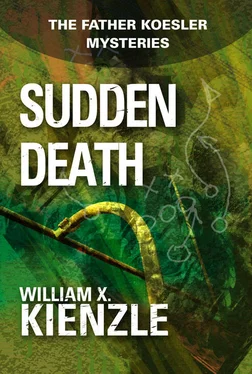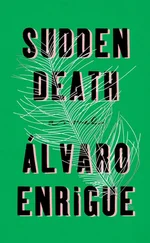William Kienzle - Sudden Death
Здесь есть возможность читать онлайн «William Kienzle - Sudden Death» весь текст электронной книги совершенно бесплатно (целиком полную версию без сокращений). В некоторых случаях можно слушать аудио, скачать через торрент в формате fb2 и присутствует краткое содержание. Жанр: Криминальный детектив, на английском языке. Описание произведения, (предисловие) а так же отзывы посетителей доступны на портале библиотеки ЛибКат.
- Название:Sudden Death
- Автор:
- Жанр:
- Год:неизвестен
- ISBN:нет данных
- Рейтинг книги:4 / 5. Голосов: 1
-
Избранное:Добавить в избранное
- Отзывы:
-
Ваша оценка:
- 80
- 1
- 2
- 3
- 4
- 5
Sudden Death: краткое содержание, описание и аннотация
Предлагаем к чтению аннотацию, описание, краткое содержание или предисловие (зависит от того, что написал сам автор книги «Sudden Death»). Если вы не нашли необходимую информацию о книге — напишите в комментариях, мы постараемся отыскать её.
Sudden Death — читать онлайн бесплатно полную книгу (весь текст) целиком
Ниже представлен текст книги, разбитый по страницам. Система сохранения места последней прочитанной страницы, позволяет с удобством читать онлайн бесплатно книгу «Sudden Death», без необходимости каждый раз заново искать на чём Вы остановились. Поставьте закладку, и сможете в любой момент перейти на страницу, на которой закончили чтение.
Интервал:
Закладка:
“I just left it that way and wore it for the devotions. All the nuns were sitting in the front pews. I wish you could have seen the faces of the two jokers when they saw I was wearing the funeral ribbon. They told me they got in a lot of trouble over that one. . ‘a scandal to the good people of the parish’ and all that.
“Now you’d think that might have cured them. But some time later, when they were certain I was scheduled for the early weekday Mass, they laid out the vestments the night before. They had a purple stole, a green maniple, and a black chasuble.”
“Don’t tell me,” McNiff interrupted, “you didn’t have the first Mass!”
“With their luck, it couldn’t have happened any other way. Father Pompilio wanted to go on an early morning fishing trip and traded Masses with me. Fortunately, he didn’t report them. But he was convinced they were certifiably insane.”
“Remember,” McNiff spoke through his laughter, “the time when everybody thought I was insane?”
“The time-? Hmmm. . there were so many. But since you’re talking about Melvindale, it’s probably the one where you came back for the parish fall festival.”
It would not occur to Koesler to head McNiff off at the pass merely because the anecdote was ancient and oft repeated. Good stories remained good even when retold.
“That’s the one. It was, O Lord, three or four months after I was transferred from Melvindale and I had nothing more to do with the parish. But old Jake Parker wasn’t feeling all that good and he asked me to come back and stand in for him at the fall festival. That’s where I was insane: in agreeing to do it.
“Well, it was just your ordinary parish festival with simple little games and prizes and a few rides. All except for the big card game in the rear of the tent. The ushers got kind of carried away and were hosting a full-scale gambling concern-poker, blackjack, that stuff. And that’s when the good old Melvindale police got into the act: closed us down, made some charges. Meanwhile, old Jake Parker is up in bed nursing a cold while I am trying to handle the cops.”
Purple stole, green maniple, and black chasuble. Why was this thought continuing to distract him? Koesler tried to pay attention to McNiff s story.
“And that wasn’t even the worst part. Who does the Free Press reporter call for a statement-Jake Parker, the pastor and the one responsible for it all? No, he calls me. And what do I say? I say, ‘Why don’t you tell your editor that you couldn’t find Father McNiff?’ And what does the Free Press reporter write in next morning’s paper? He writes, ‘A certain Father McNiff, when contacted about the police raid, stated, “Why don’t you tell your editor you couldn’t find Father McNiff?’”
“It was at that point that all my peers and classmates were willing to pronounce me certifiably insane.”
“And rightly so.”
They split the bill plus tip evenly. Kay Marie bade them good evening and asked them to pray for her aunt the nun. When McNiff, after asking, was informed that the nun was eighty-four and pondering retirement, he asked Kay Marie to have her aunt pray for them.
During his drive home, Father Koesler tried to listen to WQRS, the classical music station. But it was offering chamber music, which Koesler easily could live without. He switched off the radio and smiled as he recalled the stories, some old, some new, that McNiff had told. And he smiled as he recalled the stories, all old, that he had told.
But his preoccupation with the vestments of mixed colors still puzzled him. The problem was not intrinsic to the story. Koesler had told that story many times; never had he been troubled or puzzled by it.
From time to time he wondered if he were coming down with Alzheimer’s syndrome, or whether it was just the natural disintegration of the brain cells that accompanies aging. But then, in good time, it would all come together and make sense.
So he was confident that at some unpredictable time the elusive link between the color-confused vestments and whatever they reminded him of would be made clear. Probably it would happen while he was showering. For some strange reason, the routine of showering always cleared his mind for some of his better thinking.
5
Father Koesler was showering. It was a quarter to eight on a bright Thursday morning. Mass was at eight-thirty. As usual, the priest’s mind wandered in an undirected path.
Something, some inner feeling, some intuition told him the police were going to catch the killer of Henry Hunsinger today. This was, after all, the fifth day of the investigation. And Inspector Koznicki had told him more than once that the longer a case remains unsolved, the less likely it is that they will arrive at a solution.
Then there was the assurance by Lieutenant Harris that they would, indeed, solve the case. The professional confidence of Harris and Sergeant Ewing, Koesler was convinced, simply could not be gainsaid.
At any rate, the police would not be the only ones busy today. Koesler faced the crush of business that had piled up, due in part to his early participation in the investigation as well as to his day off yesterday. For one thing, shortly after breakfast there would be two days of mail to attack. Oh, well, everything in its allotted time. It would, in any event, be a busy day.
After showering, shaving, and dressing, he had just a few minutes to look over the Scripture readings for today’s Mass. After all his years of being a priest, reading and meditating on the Bible and preaching, it did not take him long to come up with a two- to five-minute commentary on the Scripture of the day.
This was another of the many changes resulting from Vatican II. In the first decade of his priesthood, Koesler would offer a sung Mass entirely in Latin and there was never a homily or commentary during the week. This custom of preaching daily, if briefly, was much more demanding of the priest. It also made a lot more sense.
Seven people were waiting in the church. The usual customers. Koesler knew them all well. By the time he vested and was ready for Mass, there might be one or two more present.
The Mass began as informally as a very formally structured ceremony could. In no time, he reached the Gospel reading. It was from St. Mark, the eighth chapter. Everyone stood as he read:
“When they arrived at Bethsaida, some people brought him a blind man and begged him to touch him. Jesus took the blind man’s hand and led him outside the village. Putting spittle on his eyes, he laid his hands on him and asked, ‘Can you see anything?’ The man opened his eyes and said, ‘I can see people but they look like walking trees!’ Then a second time Jesus laid hands on his eyes, and he saw perfectly; his sight was restored and he could see everything clearly. Jesus sent him home with the admonition. ‘Do not even go into the village.’”
The congregation sat and looked expectantly for today’s message.
“That little story,” said Koesler, “is my favorite miracle. It’s so much more. . well. . human than the usual miracle. This is not a grand show of power like stilling the angry winds that are whipping up the waters of the Sea of Galilee or calling Lazarus back from the dead after three days in the tomb.
“This is a more tentative kind of cure, if you will, instead of miracle. Can’t you just see Jesus rubbing a little spittle on the blind man’s eyes and saying, ‘How’s that? Do any good?’ And the guy says, ‘I don’t think you’ve got it yet. All I see is stick people walking around like trees. Have you got anything else up your sleeve?’ And Jesus says, ‘Okay, give me one more shot at it.’ And he touches the blind man again. Then the blind man says, ‘I can see everything very clearly now. I think you’ve got it! By George, you’ve got it!’
Читать дальшеИнтервал:
Закладка:
Похожие книги на «Sudden Death»
Представляем Вашему вниманию похожие книги на «Sudden Death» списком для выбора. Мы отобрали схожую по названию и смыслу литературу в надежде предоставить читателям больше вариантов отыскать новые, интересные, ещё непрочитанные произведения.
Обсуждение, отзывы о книге «Sudden Death» и просто собственные мнения читателей. Оставьте ваши комментарии, напишите, что Вы думаете о произведении, его смысле или главных героях. Укажите что конкретно понравилось, а что нет, и почему Вы так считаете.












